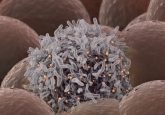Study provides new insight on cancer stem cell regulation

Researchers at the Sanford-Burnham Medical Research Institute (CA and FL, USA) have uncovered a stem cell signaling process that can lead to intestinal tumors if disrupted. This study, which was recently published in Cell Reports, identifies specific stem cell molecules that could be targeted to prevent the onset, progression and recurrence of intestinal cancers.
The intestine is covered by a single layer of epithelial cells that are renewed every 3–5 days. The intestinal stem cells that replace these epithelial cells need to be regulated to maintain homeostasis.
The Sanford-Burnham team previously discovered that protein kinase C-zeta (PKC-ζ) acts as a tumor suppressor that maintains homeostasis of intestinal stem cells. This study further reveals the mechanisms behind this maintenance, demonstrating that PKC-ζ normally inhibits stem cell activity through downregulation of the β-catenin and Yap pathways.
“Disturbing the homeostasis of the stem cell pool can go two ways – it can either reduce intestinal epithelial cell regeneration or increase the proliferation of stem cells,” explained Maria Diaz-Meco from Sanford-Burnham, co-author of the paper. “Cancer is produced by the accumulation of mutations in critical genes that control central mechanisms of cell growth. Stem cells are a ‘permanent’ population in the intestine and a reservoir for those mutations. Therefore, if stem cell activity is increased, as in the case of intestines deficient in PKC-ζ, then the likelihood of developing tumors is much higher, and when the tumor is initiated it becomes more aggressive.”
Utilizing a mouse model for intestinal cancer, the group found that this process is kept under control via direct phosphorylation of β-catenin and Yap by PKC-ζ. Jorge Moscat (Sanford-Burnham) explained that the tumorigenic profiles of PKC-ζ, β-catenin and Yap were then confirmed in human colon adenocarcinoma samples.
Furthermore, the correlation of human results with the in vivo mouse studies strongly suggested that Yap and β-catenin could be targets of PKC-ζ function and have the potential to be targets for new anticancer therapies.
“Our results offer new possibilities for the prevention and treatment of intestinal cancers by blocking the pathways that lead to tumors,” stated Moscat. “They also highlight a new strategy to promote intestinal regeneration after acute or chronic damage, such as that triggered by chemotherapy and radiation.”
Sources: Llado V, Nakanishi Y, Duran A et al. Repression of Intestinal Stem Cell Function and Tumorigenesis through Direct Phosphorylation of β-Catenin and Yap by PKCζ. Cell Reports, doi: 10.1016/j.celrep.2015.01.007 (2015) [Epub ahead of print]; Sanford-Burnham Medical Research Institute press release



